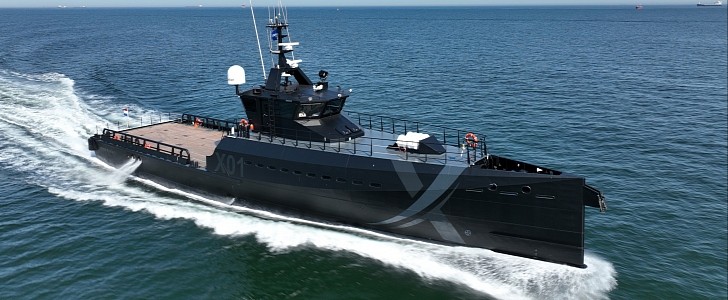This is the Royal Navy’s “Autonomy and Lethality Accelerator,” gathering experts who are developing and testing the latest technology before rolling it out. These guys really move fast – the latest ship to join the fleet was purchased, adapted for the Navy’s use, and delivered in just 12 months. Since it’s part of NavyX, you can already tell that it’s no ordinary boat.
The XV Patrick Blackett is a floating testbed for technological innovations and autonomous systems. Instead of overloading the Navy’s regular ships, which are most of the time deployed in faraway places, this new ship will be entirely dedicated to experimentation.
The famous Damen Shipyard in the Netherlands is the one that built the test ship. It’s a Damen 4008 Fast Crew Supply ship with a length of 42 meters (138 feet) and a 297 GT, able to go as fast as 20 knots (23 mph/37 kph). It was also modified to support NavyX military operations.
This includes an innovative “plug-and-play” configuration that supports a new concept called PODS (Persistently Operationally Deployed Systems). Basically, the ship will be versatile enough to be adapted to different types of experiments and tests. Plus, its work deck is fitted with “container secure points” that allow a wider range of payloads to be embarked. A five-people crew will be handling this new beast.
Some of these future experiments include drones, autonomous vessels, and AI decision-making. According to the Navy, this new floating vessel might also be fitted with autonomous technology in the future. Until then, it’s gearing up to take part not just in the Navy’s experimental missions but also in NATO exercises.
The new XV Patrick Blackett was named after a former Royal Navy sailor and physicist. Blackett not only served in the Royal Navy in WWI and played an important strategic part during WWII but also won the Nobel Prize for Physics in 1948. There couldn’t have been a more fitting name for this new experimental vessel that’s also meant for game-changing missions.
